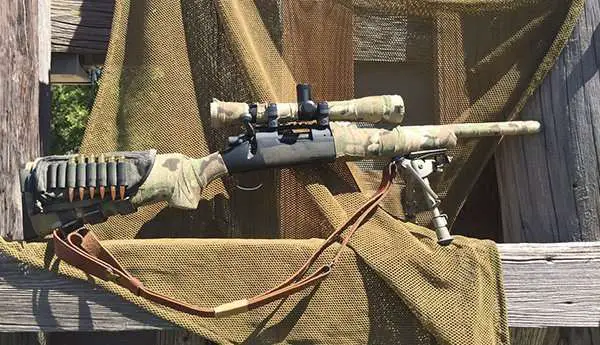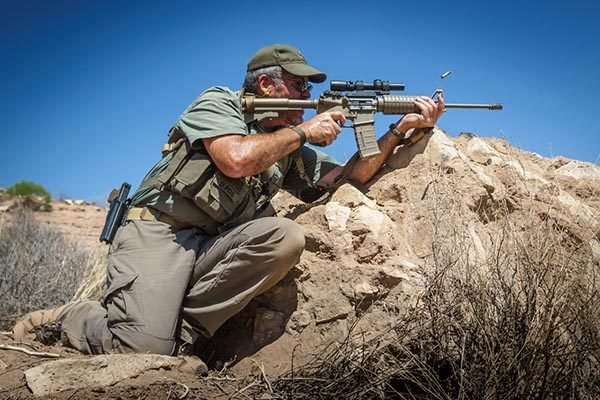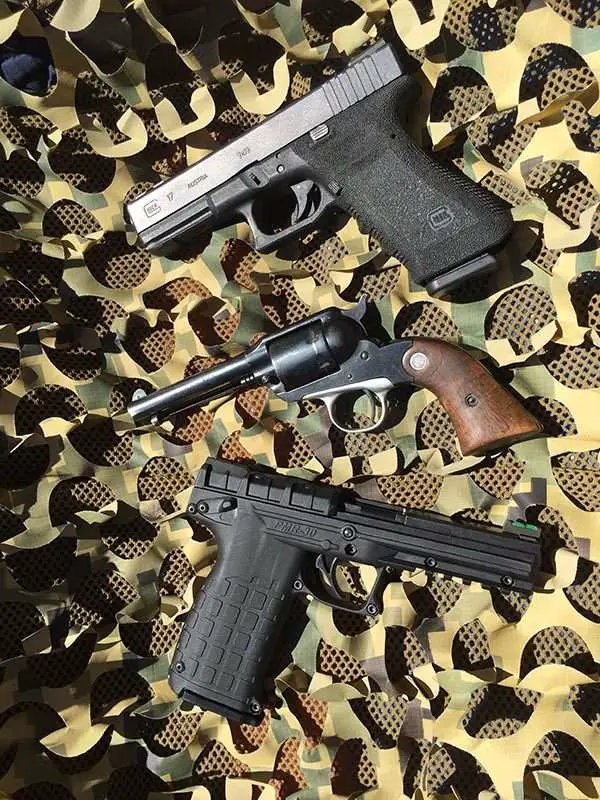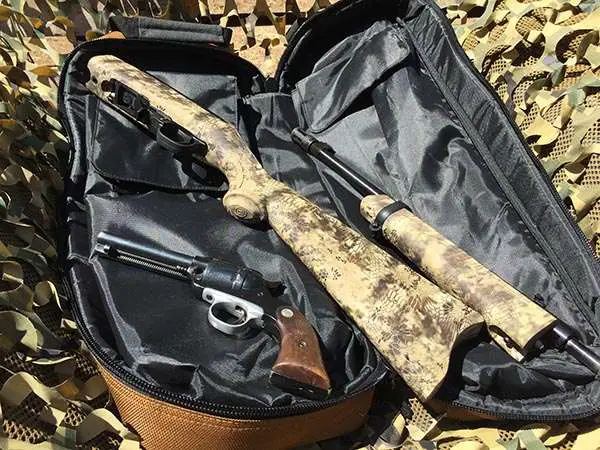
Best SHTF Guns
Let’s pretend for a moment that the world of tax-funded public safety and well-stocked grocery stores are a thing of the past and you, perhaps with a handful of family and friends, must fend for yourself in a tough and perhaps hostile environment. This is more real and possible now than any time in recent past.
Among the considerations for survival are, of course, firearms.
Which would you choose?
The most critical consideration for firearms in our scenario would be reliability … does it go “bang” with every trigger press? Does it cycle the widest possible spectrum of ammo available in that caliber? Is it simple to maintain?
What ammunition is likely to be found in the area?
It’s a given that one of each major civilian classification of firearms will be needed—a handgun, a rifle, and a shotgun. Our task here is to pick an ideal group of five.
SHTF 5.56 NATO Carbine:

A carbine, with its shorter barrel, offers maximum portability as well as the capability of reaching out to larger game, within limited range, to provide for food. Larger capacity magazines and quick reloading capability may be necessary to defend against attackers of the two-legged variety.
My choice for a long-term carbine partner is the AR-15. The platform is proven as reliable, and most owners have accumulated a supply of spare parts. Ammunition and magazines as of this writing, are readily available.
The .223/.556 cartridge is admittedly not the most ideal for down range energy. Thanks to the other virtues named here, though, it garners top billing on the list. I have personally taken deer sized game with the .223/.556, and feel that it works well in many different situations.
A good bang for your buck in terms of reliability and affordability is Aero Precision.
SHTF 9mm Handgun

The Glock 17/19 has a long track record of reliability and the other criteria here. While Glock offers a wide variety of calibers and models the 9mm is a commonly available cartridge worldwide, and less pricey. Like the AR-15, parts are currently ubiquitous, and many are interchangeable between models/calibers.
As a true aficionado of the 1911, it’s hard to think of turning my back on that old standby. Indeed, it’s more accurate. But it falls behind, quickly, where ease-of-maintenance and magazine capacity are concerned. Newer models are, in my experience, less reliable than Colt originals.
Concealability, which may or may not be a consideration in this scenario, isn’t easy with the G17 but the Glock 19 can bridge this gap.
Any 9mm pistol listed in this article will be good to go.
SHTF 12 Gauge Shotgun

This was the easiest choice. A shotgun in general has nearly endless applications based on the variety of loads available, especially if one has reloading equipment. The Remington 870 pump action, chambered in 12 gauge, has endured as one of the most reliable shotguns in history.
It’s inexpensive, made for utility, and rugged. Semi-auto shotguns abound on the market today, but none have the reliability or simplicity of the 870. The gauge selection is due to the wide range of loads available in 12 gauge.
The Mossberg 500 was a close runner-up, but the 870 edged it out thanks to personal experience and the references of friends in law enforcement. It’s capable of earning its keep by obtaining large and small game and is an effective defense weapon.
Traditional hunting models are probably the most common 870s in civilian homes. The police model, with its shorter 18-inch barrel and larger magazine capacity, offers more practicality. Either one will serve the owner well, with greater reliability than most semi-auto shotguns.
I have taken everything from birds to varmints to big game with a 12 gauge 870. Not to mention the shotgun is an effective deterrent against two legged pests.
You can’t go wrong with a Remington 870 or a Mossberg 500.
SHTF Bolt-Action Rifle

As with the AR-15, the brand and model are less important as there are many choices with legendary track records. It’s comforting to know that, with the assistance of an optic, the little arsenal includes something that can be effective at long distances for most game and any precision shooting needs.
The ideal caliber would be .308 Winchester due to availability. .30-06 would be a close second. Both calibers are more or less commonly available. Both can effectively take any game in North America and of course provide greater long range precision capabilities than the 5.56 NATO chambered AR-15 mentioned above.
Rate of fire and weight are potential drawbacks with this firearm. In comparison to others here, this platform requires greater knowledge and time investment on the part of the operator to accomplish the long-range feats it’s capable of.
SHTF .22 Rimfire

There’ll be plenty of nay-sayers for this cartridge as a final choice, but the .22 has been a ballistic tool of choice for hunters, assassins, farmers, and housewives for over a century. It has eliminated countless barnyard varmints and more good and bad guys than I care to count.
If we as consumers discount the memory of the days when .22 was three cents per round, the cost and availability factors aren’t as dire as it once was just a mere year ago.
Notice there’s no make and model named in the subheading—that’s a reflection of how difficult it is to choose among the many candidates. In the end, utility is king. Some my favorites are the Ruger 10-22 takedown, Ruger 22 Bearcat, S&W Model 17 Revolver or the KelTec PMR or CMR 30 in 22 magnum (if you have a good supply of 22 mag ammo).
Choices in this category are endless and should boil down to what you have experience and confidence in. Another consideration, five hundred rounds of .22 is portable in comparison to other calibers.
Many will likely argue that a .22 rifle is preferable to a .22 handgun. And I’d not argue back much, especially when discussing a firearm for a beginner to use effectively. In a world where the return on investment of both resources and calories is key, perhaps a .22 should be at the top of this list.
Conclusion:
This is obviously all one person’s opinion. There are virtually endless choices and considerations—for example, what if the environment was urban or in a foreign country? List your own version of this TOP 5 in the comments.

